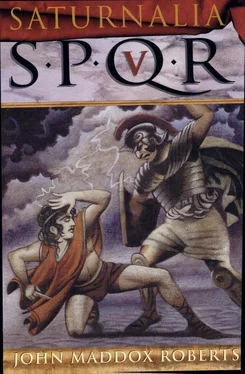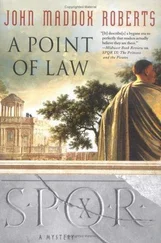John Roberts - Saturnalia
Здесь есть возможность читать онлайн «John Roberts - Saturnalia» весь текст электронной книги совершенно бесплатно (целиком полную версию без сокращений). В некоторых случаях можно слушать аудио, скачать через торрент в формате fb2 и присутствует краткое содержание. Год выпуска: 0101, ISBN: 0101, Издательство: St. Martin, Жанр: Исторический детектив, на английском языке. Описание произведения, (предисловие) а так же отзывы посетителей доступны на портале библиотеки ЛибКат.
- Название:Saturnalia
- Автор:
- Издательство:St. Martin
- Жанр:
- Год:0101
- ISBN:9780312320188
- Рейтинг книги:4 / 5. Голосов: 1
-
Избранное:Добавить в избранное
- Отзывы:
-
Ваша оценка:
- 80
- 1
- 2
- 3
- 4
- 5
Saturnalia: краткое содержание, описание и аннотация
Предлагаем к чтению аннотацию, описание, краткое содержание или предисловие (зависит от того, что написал сам автор книги «Saturnalia»). Если вы не нашли необходимую информацию о книге — напишите в комментариях, мы постараемся отыскать её.
Saturnalia — читать онлайн бесплатно полную книгу (весь текст) целиком
Ниже представлен текст книги, разбитый по страницам. Система сохранения места последней прочитанной страницы, позволяет с удобством читать онлайн бесплатно книгу «Saturnalia», без необходимости каждый раз заново искать на чём Вы остановились. Поставьте закладку, и сможете в любой момент перейти на страницу, на которой закончили чтение.
Интервал:
Закладка:
“I did pretty well for myself,” I said. “I settled for one and was about…”
“You would have been killed had you been alone,” she said flatly. “Do you think the men were Clodia’s?”
“No, and that is a part of all the things that have bothered me about this case. It’s not Clodia’s style.”
“Have you forgotten?” she said crossly. “I told you that she might do just such a thing to divert attention from herself.”
“I remember quite well. No, it’s the quality of the men. I’ve been in Clodia’s house quite a bit”-I caught her look and added hastily-”in the line of duty, of course. Everything Clodia owns, buys, hires, or in any way whatever associates with, is first class. Her clothes, her furniture, her collection of art, even her slaves all are of the very highest quality.”
“I’d like to get a look at her house some time,” Julia said wistfully.
“But Milo’s thugs said that the attackers were very inferior fighters from an inferior school. Even allowing for the customary school rivalry, they did seem less than adept. They were not very pretty either. If Clodia had hired assassins, she would have hired only the best.”
“No pursuit is so low that good taste cannot be observed,” Julia said. “I still think you’re trying to find her innocent in spite of all evidence.”
“Then listen to this.” I told her about the interview with Narcissus. She was enthralled by, of all things, Asklepiodes’s diagnosis of the injury caused by the falling roof tile.
“And he can actually open up a man’s head and heal so terrible an injury!” she said, dropping her fan and clasping her hands in delight. “Such a skill must truly be a gift from the gods.”
“Well, if anyone can do it, it must be Asklepiodes. Now pay attention. That is nothing.”
“Nothing!” she said before I could continue. “All you men spend your days scheming about how to injure people and you idolize the worst butchers, but you think it is nothing that someone can draw an injured man back from death like that!”
“I don’t go around injuring people,” I protested. “And I don’t admire people who do. Besides, we don’t know that he will pull through. Marcus Celsius may have the Styx lapping about his ankles this very moment.” How had we gotten off onto this? “Enough. Let me tell you about a less admirable physician.”
Julia listened open-mouthed as I described the activities of the late Ariston of Lycia.
“Oh, this is infamous!” she cried. “A physician, sworn to the gods by the oath of Hippocrates, deliberately poisoning his patients!”
“You think you’re shocked?” I said. “He was my family’s physician. Suppose I’d fallen ill?”
“Do you think you are important enough to poison?”
“Some people have deemed me quite worthy of homicide.”
“They might have stabbed you to death in the street, perhaps. That usually calls for a temporary exile. Poisoning brings a terrible punishment.”
“It is a puzzler, and that brings up another question. With all the suspicions about her, why would Clodia poison Celer? She had to know that she would be the most prominent suspect. If she, as you suggested, might wish to divert suspicion from herself, would she not have hired an assassin to strike him down in the city? Everyone would have automatically assumed that he had been killed by one of his multitude of political enemies.”
That gave her something to think about. “It does confuse things.”
“So, having determined that the poison originated with Harmodia and that Ariston was the vector, as it were, by which it was transmitted to the victim, I have to sift through the rather numerous suspects to determine which one hired Ariston”.
“Must it be only one?” she asked.
“What do you mean?”
“As you’ve said, Celer had no dearth of enemies. Might Ariston not have shopped his services around to a number of them? He might have taken pay from more than one, and each would think that he was the only one who had hired Ariston.”
“I hadn’t thought of that,” I admitted, intrigued by the idea. “It would present some interesting judicial problems in assigning guilt, wouldn’t it? I mean, if it wasn’t, technically, a conspiracy, how would the courts go about punishing them? Give each a portion of a death sentence? Find extremely tiny islands for them all?”
“Rein in your imagination,” she said. “Probably only the saga would get the full sentence of the law; perhaps the Greek physician as well. Those who hired him might get off with exile, since they were probably of the nobility. They would at least be given the option of honorable suicide.”
“Probably,” I mused. Then I shook my head. “It wouldn’t work anyway. The more people Ariston involved, the greater the chance of discovery. He was a cautious man, and poison is notoriously the weapon of a coward. I can’t imagine him being so bold as to dupe a number of murderously inclined men that way. I think he sold his services to one of them and deemed himself safe.”
“It is worth considering. Anything else?”
“Yes, I conferred with Flavius, the fire-eating tribune of last year.” I told her of my interview. “He was everything I’d hoped: violent, abrasive, obnoxious, and a firm supporter of Pompey.”
“So what is wrong?”
“He’s too good to be true. Besides, everything about him proclaims a willingness, even an eagerness, to shed his enemy’s blood with his own hands. I just don’t think poison is his style, although Celer’s death was awfully convenient for him, coming when it did. His anger when I brought up the subject of poisoning was too convincing. If he’d been expecting the accusation, I doubt he’d have been able to summon up that extravagant facial color on cue.”
“I am not convinced that your judgment of men is as accurate as you think, but where does that leave us?”
“It leaves us with the curule aedile Murena, who reported upon the death of Harmodia and then sent for the report, which has subsequently disappeared.”
“Have you found him?”
“I have. I told you I haven’t been wasting my time today.”
She patted my hand. “Yes, dear, I didn’t mean to imply that you are an irresponsible overgrown boy who drinks too much. Now proceed.”
I told her of my interview with Murena in the jeweler’s market, finishing with: “And then I walked out into the Forum and you found me.”
“Politically, he sounds just like you,” she observed.
“That’s the problem. I rather liked the man. But I won’t deny that I have been fooled before.”
“There are too many things that don’t fit together,” she said. “There has to be something we are overlooking.”
“Undoubtedly,” I said, gloomily. “I am sure it will come to me in time, but time is just what we’re short of. It’s going to do us little good if, six months from now, I wake up in a leaky tent in Gaul while the savages beat their drums and toot their horns all around the camp in their massed thousands and I cry, ‘Eureka!’ ”
“Yes, that would do us little good,” she agreed.
“Did you hear anything last night?”
“I may have. After the banquet was over and the slaves had departed for the festivities, we cleaned up the triclinium and the ladies of the various households visited among themselves, bringing gifts. It’s traditional.”
“I’m familiar with the custom,” I told her. “My father’s house has been without a lady since my mother died and my sisters married, but I remember them all flocking about on Saturnalia.”
“Since my uncle is pontifex maximus, we went nowhere. Everyone came to us. Only the family of the Flamen Dialis has as much prestige, and there hasn’t been one of those in almost thirty years.” The high priest of Jupiter was so bound by ritual and taboo that it was increasingly difficult to find anyone who wanted to assume the position, prestigious as it was.
Читать дальшеИнтервал:
Закладка:
Похожие книги на «Saturnalia»
Представляем Вашему вниманию похожие книги на «Saturnalia» списком для выбора. Мы отобрали схожую по названию и смыслу литературу в надежде предоставить читателям больше вариантов отыскать новые, интересные, ещё непрочитанные произведения.
Обсуждение, отзывы о книге «Saturnalia» и просто собственные мнения читателей. Оставьте ваши комментарии, напишите, что Вы думаете о произведении, его смысле или главных героях. Укажите что конкретно понравилось, а что нет, и почему Вы так считаете.









